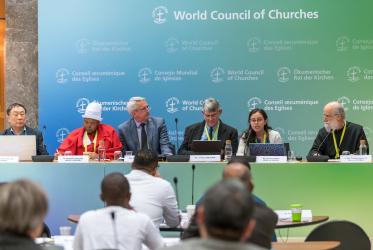Dakar, Senegal
23 - 25 April 2001
We, eighty-two (82) participants from sixteen (16) countries from West and Central Africa, Madagascar and Djibouti, representing churches, national councils of churches and related NGOs, as well as mission partners meeting in Dakar, Senegal under the auspices of the All Africa Conference of Churches and hosted by the Protestant Church of Senegal from April 23rd - 25th 2001, have noted with concern the frightening spread of HIV/AIDS in Africa.
The consultation, which was held for church leaders, sought ways in which the churches in Africa could be better informed to enable them respond more positively to the HIV/AIDS pandemic.
It is becoming increasingly clear that Africa, especially South of the Sahara, is the area worst affected by HIV/AIDS in the world. Infection levels are highest, access to care is lowest, and social and economic safety nets that can help families cope with the impact are weak. Current estimates by UNAIDS and WHO indicate that out of 36 million persons globally infected by HIV/AIDS, 25.3 million of them live in Sub-Saharan Africa. This is about 70% of the world's total population of infected people in a region that forms just 10% of the world's population.
The critical situation in Africa is due to factors such as:
-
wars and ethnic conflicts
-
migration
-
poverty
-
lack of knowledge and information
-
socio-cultural practices e.g. wife inheritance, female genital mutilation etc
-
inadequate commitment on the part of churches, governments and other related organizations
-
break down in morality due to negative influence of the media, tourism, etc.
Having spent three days at the consultation, we were moved by:
-
Senegal's experience, efforts and achievements at managing the HIV/AIDS crisis
-
Interactions and perspectives shared by different countries in the group work
-
Living testimonies of persons living with HIV which challenged the insensitivity, lack of knowledge, and indifference of some of our churches
-
Visit to centers engaged in HIV/AIDS management.
Considering the seriousness of the HIV/AIDS pandemic, we recommend that the churches in Africa:
-
make the fight against HIV/AIDS a top priority in their activities
-
intensify education and information sharing on HIV/AIDS by including the issues in curricula of seminaries/theological institutions and lay training centers
-
engage in theological, social and cultural reflections on HIV/AIDS to guide the churches' interventions
-
facilitate interaction and sharing among, and with people living with HIV/AIDS (PLWHAs) and their families
-
initiate and participate in national, regional and global advocacy campaigns for affordable anti-retroviral drugs for PLWHAs
-
mobilize church workers for capacity building in addressing the HIV/AIDS crisis
-
network with each other, ecumenical partners and with related organizations working on HIV/AIDS to avoid duplication and competition
-
strengthen the existing church structures to facilitate working on HIV/AIDS
-
set up, equip and support units to meet the medical, spiritual, psycho-social and economic needs of PLWHA and their families
-
identify those socio-cultural practices that could be risk factors to HIV/AIDS and educate people to work toward their eradication
-
strengthen the South-South and North-South partnerships in the fight against HIV/AIDS
-
involve PLWHAs in the planning and implementation of HIV/AIDS activities
-
put mechanisms in place to protect children against HIV/AIDS and to provide care and support to those infected and/or affected
-
establish and promote programmes to empower youth and women to help them make informed choices
DECLARATION
We present at this consultation pledge to work in collaboration with our churches, ecumenical partners and related organizations to see to the effective implementation of the above recommendations. May God assist us to work for His people to His Glory. AMEN.
Dakar, Senegal
23 - 25 April 2001
We, eighty-two (82) participants from sixteen (16) countries from West and Central Africa, Madagascar and Djibouti, representing churches, national councils of churches and related NGOs, as well as mission partners meeting in Dakar, Senegal under the auspices of the All Africa Conference of Churches and hosted by the Protestant Church of Senegal from April 23rd - 25th 2001, have noted with concern the frightening spread of HIV/AIDS in Africa.
The consultation, which was held for church leaders, sought ways in which the churches in Africa could be better informed to enable them respond more positively to the HIV/AIDS pandemic.
It is becoming increasingly clear that Africa, especially South of the Sahara, is the area worst affected by HIV/AIDS in the world. Infection levels are highest, access to care is lowest, and social and economic safety nets that can help families cope with the impact are weak. Current estimates by UNAIDS and WHO indicate that out of 36 million persons globally infected by HIV/AIDS, 25.3 million of them live in Sub-Saharan Africa. This is about 70% of the world's total population of infected people in a region that forms just 10% of the world's population.
The critical situation in Africa is due to factors such as:
-
wars and ethnic conflicts
-
migration
-
poverty
-
lack of knowledge and information
-
socio-cultural practices e.g. wife inheritance, female genital mutilation etc
-
inadequate commitment on the part of churches, governments and other related organizations
-
break down in morality due to negative influence of the media, tourism, etc.
Having spent three days at the consultation, we were moved by:
-
Senegal's experience, efforts and achievements at managing the HIV/AIDS crisis
-
Interactions and perspectives shared by different countries in the group work
-
Living testimonies of persons living with HIV which challenged the insensitivity, lack of knowledge, and indifference of some of our churches
-
Visit to centers engaged in HIV/AIDS management.
Considering the seriousness of the HIV/AIDS pandemic, we recommend that the churches in Africa:
-
make the fight against HIV/AIDS a top priority in their activities
-
intensify education and information sharing on HIV/AIDS by including the issues in curricula of seminaries/theological institutions and lay training centers
-
engage in theological, social and cultural reflections on HIV/AIDS to guide the churches' interventions
-
facilitate interaction and sharing among, and with people living with HIV/AIDS (PLWHAs) and their families
-
initiate and participate in national, regional and global advocacy campaigns for affordable anti-retroviral drugs for PLWHAs
-
mobilize church workers for capacity building in addressing the HIV/AIDS crisis
-
network with each other, ecumenical partners and with related organizations working on HIV/AIDS to avoid duplication and competition
-
strengthen the existing church structures to facilitate working on HIV/AIDS
-
set up, equip and support units to meet the medical, spiritual, psycho-social and economic needs of PLWHA and their families
-
identify those socio-cultural practices that could be risk factors to HIV/AIDS and educate people to work toward their eradication
-
strengthen the South-South and North-South partnerships in the fight against HIV/AIDS
-
involve PLWHAs in the planning and implementation of HIV/AIDS activities
-
put mechanisms in place to protect children against HIV/AIDS and to provide care and support to those infected and/or affected
-
establish and promote programmes to empower youth and women to help them make informed choices
DECLARATION
We present at this consultation pledge to work in collaboration with our churches, ecumenical partners and related organizations to see to the effective implementation of the above recommendations. May God assist us to work for His people to His Glory. AMEN.





